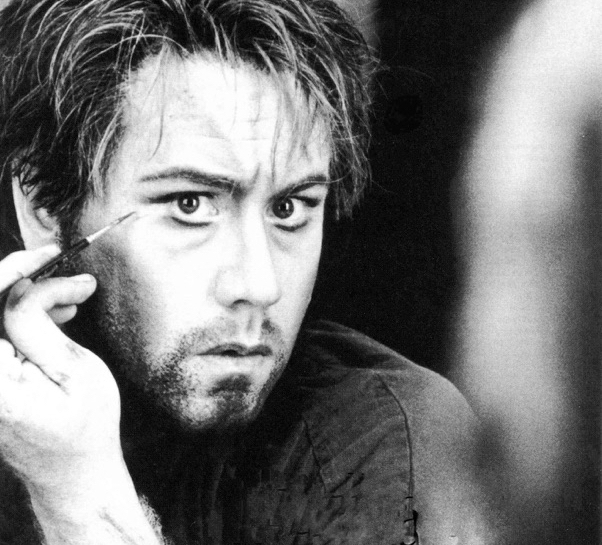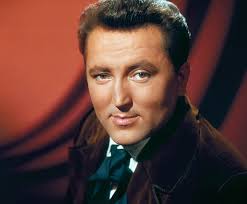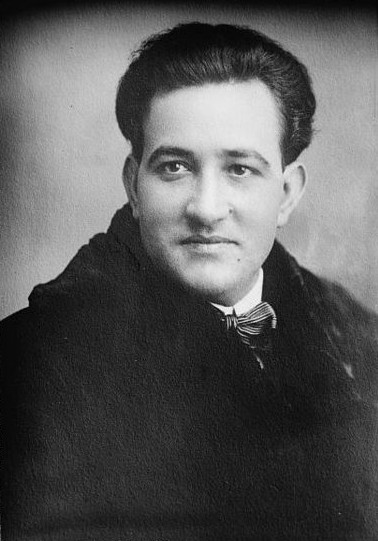|
SATURDEE OPRY LINKS 70: All
Kinds of Tenors
  
Richard Leech
Fritz Wunderlich
Miguel Fleta
Saturdee Opry Links Overture!
Don Giovanni, by Mozart.
https://www.youtube.com/watch?v=raO6b59q_WU
1.
"Who's the greatest tenor?" is an endless and futile (silly, really) game played
by all manner of crazed operaphiles (redundant.) There are very great tenors who
are head and shoulders above all others, but in the end, posing this question is
like asking to name the grandest tree, the prettiest flower, etc. Do you prefer
a heroic tenor with enormous power, or a lyric tenor with great beauty of tone?
There are all kinds of tenors, which, coincidentally, happens to be the topic of
today's Saturdee Opry Links. Here is young Luciano Pavarotti, who, of course,
had tremendous (push-button) power, and masterful command of all aspects of
singing, whether delicate or full-throated. He was 29 here, approaching his best
years. The voice is brassier, more clarion, not yet having manifested the dark
quality it later acquired. He couldn't read a note of music, by the way. How in
hell he memorized entire operas, I have no idea. That's one definition of
"genius." Here is "Che Gelida Manina," from Puccini's "La Boheme," which became
one of his signature roles.
https://www.youtube.com/watch?v=6dxWA2vqv7U
Setting: Christmas Eve in a room in an attic
Synopsis: After both of their candles go out, Rodolfo and a young woman who has
come to his room in order to relight her candle are in the darkness together.
Pretending to look for her key which she had lost in the room, Rodolfo instead
finds her hand and sings to her of his dreams and ambitions. He also tells her
that he has fallen in love with her.
Translation:
http://www.aria-database.com/search.php?individualAria=36
2.
Mozart requires such specific singing that there is actually a category called
the "Mozart tenor" that is apart from all other categories. Yes, lots of tenors
who are not Mozart tenors sing Mozart, and that's well and good, but there are
those particularly suited to Mozart opera: light-voiced, flexible. Poor old, or
poor young, Fritz Wunderlich died at 36 after falling down a flight of stairs.
His voice was flexible, lyrical, but also had power. He was inclining toward
singing Verdi and other heavier opera at the time of his death, when he was
considered a great Mozart tenor.
https://www.youtube.com/watch?v=0TnruLf_haY
Here he is with Tamino's aria (you will recognize it) from "The Magic Flute."
Role : Tamino, a young prince of Egypt
Setting : A magical forest
Synopsis : When the Three Ladies come by and take Papageno away, they give
Prince Tamino a portrait of Princess Pamina. He is captured by her beauty.
Translation:
http://www.aria-database.com/translations/mflute03_bildnis.txt
3.
Just to show you how subjective taste is, I'm ambivalent about the great
contemporary tenor---all the rage in the opera world---Jonas Kaufmann. I believe
he is a spinto, which is a lyric tenor able to punch through on the
power-notes. He is a tremendous singer, highly intelligent, duly lauded. He has
sung many of the most difficult heroic tenor roles, including those of Wagner,
and although he is trying to sing less (in order to spend time watching his kids
grow up), he is at his peak at 47. But there is something in his tone, and
manner or singing, that puts me off. He has a baritonal quality, for starters,
and my guess is that he is actually a "baritenor" (a baritone with tenor range.)
So every time I hear him, I feel like I am hearing a baritone. And there is a
kind of thickness in his singing, deliberately invoked---the "covered voice"---that I
sometimes find
unattractive. I'm possibly a minority of one, in this regard. Not incidentally,
he is a good fit for heldentenor, which a heroic tenor voice with a dark tone
endemic mostly to Wagner. Here he is with "Nessun Dorma," from Puccini's "Turandot."
https://www.youtube.com/watch?v=suj-2sbSFKs
Role: Calaf, the "Unknown Prince", son of Timur
Setting: The gardens before the walls of Peking
Synopsis: A herald has just announced that no one will sleep in the city of
Peking until the Calaf's name is known to the Princess. Calaf, who knows that he
has agreed to be killed if Turandot learns his name before the morning, is not
worried. He is sure that he will be the only one to reveal his name to the
Princess and he will only do that once morning has come and the Princess has
consented to be his wife.
Translation:
http://www.aria-database.com/search.php?individualAria=318
Pavarotti had a dark timbre, for a tenor, yet he seems light and bright compared
with Kaufmann.
https://www.youtube.com/watch?v=RdTBml4oOZ8
4.
A "tenor di grazia" is a light voice, also known as "leggero tenor," and the
male equivalent of the coloratura. You listen to Tito Schipa, and even though he
was one of the great "tenor di grazias," you wonder, where at least a little
punch, a little power? This is practically. . .crooning! How did this guy make
it in opera? Not only did he make it, but he is revered, even now. Pavarotti,
whose voice dwarfed Schipa's in power, worshiped the man's singing. Why? He was
a superb stylist, a master of the flowing melodic line, never sacrificing
enunciation for effect. There's more to it, but that will have to do. Here is
Schipa with the old Neopolitan heartbreaker, "Core 'n' Grato," ("Ungrateful
Heart"), a song usually invoked in concert in order for the tenor to "knock 'em
dead." Note Schipa's delicacy.
https://www.youtube.com/watch?v=eIM9f1k-U90
Translation:
http://www.lieder.net/lieder/get_text.html?TextId=4018
Pavarotti in awe of Schipa:
https://www.youtube.com/watch?v=Thrb-ZZGsTc
About Schipa:
http://greatoperasingers.blogspot.com/2010/05/tito-schipa-ultimate-tenore-di-grazia.html
For contrast, here is a "knock 'em dead" treatment by Mario Del Monaco:
https://www.youtube.com/watch?v=iWNZiOvCwaQ
5.
Juan Diego Florez was gifted with one of the prettiest leggero tenor voices of
our time, and made his substantial career in bel canto repertory best suited to
that voice type. But this Peruvian leggero is turning into a pumpkin at
midnight, as so often happens to lighter-voiced tenors as they age---that is, he
is acquiring power and moving on to weightier roles. Here he is with the lark,
"Au Mont Ida," from the Offenbach operetta, "La Belle Helene." Yes, SOL has
posted this in the past, and will do so again. Not only is this little aria just
spiffy, but Florez gets a chance not only to showcase his prodigious coloratura
skill, but big notes that, in my uninformed opinion, makes him effectively a
spinto. Have fun. (Sorry, I can never find a translation of this. In essence,
the character is telling the comedic story of a beauty contest.)
https://www.youtube.com/watch?v=IXnlyLSMTxI
Just to show how much Florez's voice is expanding, here is a recent recording of
the aria, "Pourquoi me Reveiller," from Massenet's "Werther."
https://www.youtube.com/watch?v=EWvbaw4IS2U
About the aria, translation:
http://www.aria-database.com/search.php?individualAria=657
6.
Miguel Fleta is all-but-forgotten today. Once upon a time, he created the role
of "Calaf" in Puccini's "Turandot." At 26, he debuted at the Met, where he was a
sensation, and went on to perform "Rigoletto," "Pagliacci," "Tosca," "La Bohème,"
"Andrea Chénier," and more over three seasons. Somewhere between a spinto and
dramatic tenor, he was gifted with enormous skill, great power, subtle artistry.
(Listen to the diminuendo in this aria!) A tempestuous fellow---imagine that, a
tempestuous tenor!---he eventually lied to the Met about having to serve in the
Spanish military (he actually just had another singing engagement), and that was
the end of his career in the USA. He over-sang, he over-drank, he over-ate, he
over-womanized, he got involved in Spanish politics (on the wrong side), and
basically blew out his voice and career, dying at only 41. But once upon a time.
. .
https://www.youtube.com/watch?v=ldFw1vNHVA4
Role: Mario Cavaradossi, Tosca's lover, a young painter and a political liberal.
Setting: The ramparts of a fortress
Synopsis: Cavaradossi trades his last possession, a ring, to get a guard to take
a letter to the imprisoned Tosca. As he writes the letter, he sings of his love
for Tosca and for life.
Translation:
http://www.aria-database.com/search.php?individualAria=305
7.
Our "all kinds of tenors" continues with an American tenor making his SOL debut,
Richard Leech. Now long past his prime, Leech was once a biggie, somewhat
because of his biggie notes. The guy had massive, audience-thrilling top notes.
(I saw him once, and I actually had to plug my ears, never mind how beautiful
the sound was.) A great admirer of someone else with massive, audience-thrilling
top notes, Mario Lanza, Leech actually made a kind of side-career out of doing
the occasional Lanza tribute concert (with full approval of Lanza's daughter, Ellisa Bregman.) Here he is doing meat-and-potatoes Verdi
in 1988, with restraint and dignity. No roof-rattling here, just a gleaming,
elastic tone and lovely adherence to line.
https://youtu.be/LXEkIGBVW5g
Role: The Duke of Mantua
Setting: A room in the Duke's palace
Synopsis: Discovering that someone has abducted Gilda after he seduced her, the
Duke sings of his unhappiness that someone has taken his "beloved" away.
Translation:
http://www.aria-database.com/search.php?individualAria=264
8.
When you think of great tenors, you don't think of French singers much. Georges
Thill was certainly the most admired French operatic tenor. He began with light
roles and eventually moved to verismo, even Wagner. No, his is not the
weightiest of voices. It was always marked by elasticity and a kind of bright,
ringing lyricism, but he had the "big note," at least judging by this recording
of "Che Gelida Manina" from Puccini's "Boheme." (Yes, we posted Pavarotti with
it earlier, but this was too good to pass up. Plus it's in French! Puccini in
French? Gilding the romantic lily.) It's curious how his upper register is
almost too light---operetta-light---yet he is able to burst through when need
be. This "Che Gelida Manina" varies from crooning to a "La speranza" so potent
as to be startling. 3:37.)
https://www.youtube.com/watch?v=XCYtHFWJG04
About Thill:
http://www.nytimes.com/1984/10/18/obituaries/georges-thill-is-dead-at-86-was-famous-french-tenor.html
9.
Speaking of French tenors. . .Leopold Simoneau was a Mozart tenor, pure and
simple. No big notes, no pretense of same---unless one understands that big
notes need not be big. The near falsetto of this done-to-death Bizet aria (God,
even that poseur, David Byrne sang it---and flat, at that) is right up
Simoneau's alley. This is sung with surpassing sensitivity, delicacy. As his
obit said, "Mr. Simoneau was the epitome of the French tenor, meaning that he
had a light voice, beautiful diction and a mastery of musical nuance."
Read more here:
http://www.nytimes.com/2006/08/29/arts/music/29simoneau.html
Here is "Je crois entendre encore" from "The Pearl Fishers."
https://www.youtube.com/watch?v=vlx1dNLiuHk
Role: Nadir, a fisherman
Setting: A wild and rocky shore on the coast of Ceylon in ancient times
Synopsis: In the past, Nadir had fallen in love with a beautiful Brahman
priestess named Léïla at a Brahman temple. Now, a veiled priestess has come to
his village and he recognizes her as Léïla. He sings of his love for her which
has not been diminished by the time they have spent apart.
Translation:
http://medicine-opera.com/2011/09/je-crois-encore-entendre/
FINAL BOW: The critic Martin Bernheimer once dismissed this voice as a "bleat."
Arturo Toscanini called it the greatest natural tenor voice he'd ever heard. Go
figure, eh? The caprices of subjectivity. The reality is that no matter what
this guy sang (almost), it moved people. The reality is that Placido Domingo,
Luciano Pavarotti, Jose Carreras, and countless others were inspired by him, and
revere his memory. Here he is, in crooning mode, with the beloved Tosti trifle,
"A Vucchella." Freddie Cocozza. Also known as. . .
https://www.youtube.com/watch?v=h_Vo1RQwkNc
Translation:
http://www.lieder.net/lieder/get_text.html?TextId=250
Back to Opera Links
Back to Home Page
|



